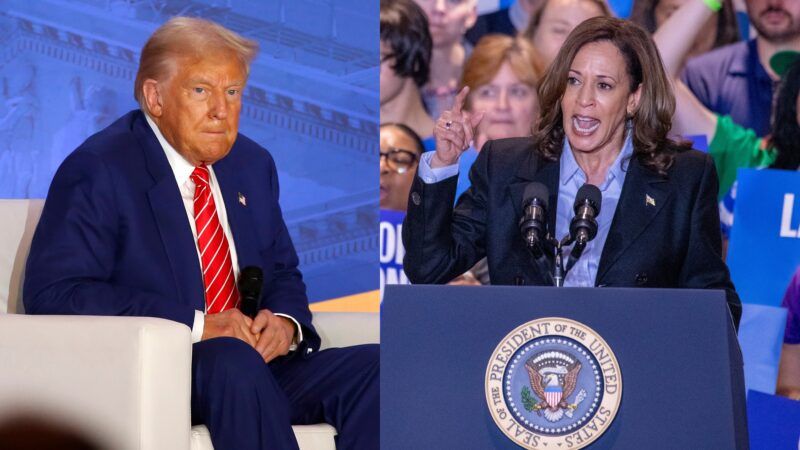Bowing to Public Opinion, Trump and Harris Both Agree That Marijuana Should Be Legal
It remains unclear whether either would do anything about that as president.

After Donald Trump endorsed a Florida ballot initiative that would legalize recreational marijuana in that state, Kamala Harris accused her Republican opponent of flip-flopping on the issue. Yet the vice president herself did not publicly support marijuana legalization until 2018, when two-thirds of Americans already favored that policy.
The truth is that both presidential candidates have changed their positions on this issue over the years, reflecting a sea change in public opinion. But that does not necessarily mean that either, if elected, would invest any effort in addressing the untenable conflict between state marijuana laws and federal prohibition.
In 1990, when Trump was famous as a billionaire New York developer rather than a politician, he called the war on drugs "a joke" and recommended legalization instead. "We're losing badly the war on drugs," he said during a speech in Miami. "You have to legalize drugs to win that war."
In an interview after the speech, Trump said he hoped "people will start to realize that this is the only answer; there is no other answer." As a Republican presidential candidate 25 years later, he implausibly claimed his 1990 remarks did not count as an endorsement of legalization.
During that campaign, Trump's position on marijuana legalization was essentially the same as Hillary Clinton's. "I really believe we should leave it up to the states," he said, although he made it clear that he took a dim view of legalization, which he described as a "bad" policy that had caused "some big problems" in Colorado.
Despite Trump's avowed preference for letting states go their own way on marijuana policy, his first attorney general, Jeff Sessions, rescinded a Justice Department memo that encouraged federal prosecutors to leave state-licensed cannabis suppliers alone. But no crackdown followed, and Sessions' successor, William Barr, did not even try to instigate one.
As president, Trump also proposed eliminating an annually renewed spending rider that bars the Justice Department from interfering with state medical marijuana programs. Nothing came of that either.
Those two moves, the Harris campaign argues, were plainly inconsistent with what Trump said in a Truth Social post on Saturday. Predicting that Florida voters will approve marijuana legalization in November, he cited reasons to welcome that outcome.
"Someone should not be a criminal in Florida" for possessing marijuana "when this is legal in so many other States," Trump wrote. Pot busts, he added, "ruin lives & waste Taxpayer Dollars."
It is fair to say that Trump's views on marijuana legalization have evolved. But the same is true of Harris.
As USA Today notes, "Harris has been criticized for aggressively prosecuting weed-related crimes when she was California's attorney general and San Francisco's district attorney, particularly given the racial disparities in punishment nationwide." She opposed a California legalization initiative in 2010, when she was the San Francisco district attorney; laughed at a question about legalization in 2014, when she was running for attorney general against a Republican who favored it; and declined, as California's attorney general, to take a position on the 2016 initiative that legalized recreational use in her state.
As a senator two years later, Harris finally took the plunge, saying, "We need to decriminalize marijuana nationwide." Later that year, she co-sponsored a bill that would have repealed the federal ban, and she introduced a similar bill in 2019.
President Joe Biden, by contrast, has always resisted federal legalization, and the 2024 Democratic platform says nothing about it. The Republican platform, meanwhile, does not even allude to marijuana reform.
That silence is striking, given that 38 states have legalized medical marijuana and 24 of them, accounting for most of the U.S. population, also allow recreational use. According to Gallup, 70 percent of Americans—including 87 percent of Democrats, 70 percent of independents, and 55 percent of Republicans—think marijuana should be legal.
As of Saturday, both major-party presidential candidates agree. But it remains unclear whether either is prepared to do anything about it.
© Copyright 2024 by Creators Syndicate Inc.


Show Comments (44)